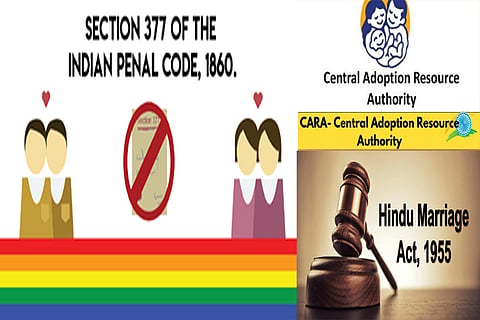

Chennai
This time around, it was the Centre that informed the Delhi High Court that marriage between same-sex couples was not permissible; the reason being that such unions are not recognised by ‘our laws, legal system, society, and values’. The submission by the Solicitor General (SG) Tushar Mehta acting on the part of the government, was made during the hearing of a PIL seeking recognition of same-sex marriages under the Hindu Marriage Act (HMA) and the Special Marriage Act (SMA).
Even last year, the Supreme Court had dismissed a plea that sought a review of its order that rejected a petition demanding civil rights including same-sex marriage, adoption, and surrogacy rights for the LGBTQ community. The issue pertains to fundamental rights guaranteed by the Constitution to every citizen, but it takes on a contentious turn when encumbered by the idea of sexuality, something the lawmakers in the country haven’t been too comfortable discussing for decades. Interestingly, a few nations have taken the lead and adopted a stance of marriage equality, granting same-sex couples the right to enter wedlock. As many as 29 countries have legalised gay marriages, with the Netherlands being the first one to do so, in 2001.
So what stops India from taking a progressive step that could grant legitimacy to members of the sexual minorities in the country? On the legal front, Mehta invoked the provisions of the HMA which has references to terms such as husband and wife and asked who would be assigned these roles if a union is solemnised for a same-sex couple. Mehta also said permitting the registration of such marriages would run contrary to various statutory provisions.
Take, for instance, the idea of adoption of a child by same-sex couples. As per the Central Adoption Resource Authority’s (CARA) guidelines, foreigners in same-sex relationships are barred from adopting children in India. In fact, in 2014, the Union Cabinet had decided to stop same-sex couples in India from becoming adoptive parents while mulling amendments to the Juvenile Justice (Care and Protection of Children) Act, 2000. But the draft Bill, which also includes aspects of rehabilitation and adoption of children, did not refer to bar same-sex couples from adoption. The law is ambiguous to the point that it does not specifically prohibit single members of the LGBTQ community from adopting a child. And as a corollary, many members of the community have been able to adopt children as single parents. But their partners are left without any legal rights over the child.
This is one aspect concerning demands made by the community for legalising same-sex marriages. There’s also the all-important question of inheritance. The Hindu Succession Act, 1956 lays down a uniform and comprehensive code on matters concerning succession and inheritance. But for any child to fall under the ambit of being a heir to his or her parent’s estate, there needs to be a recognition of the union of the parents, in which case, same-sex couples do not pass muster.
Tamil Nadu, which has been a frontrunner when it comes to recognising the needs of sexual minorities, was the first state in India to introduce a transgender welfare policy. Last year, the Madras High Court had also made a judgment upholding the marriage between a man and a transwoman. The Court said the word ‘bride’ in the Hindu Marriage Act also implies a transwoman. Long story short, India can no longer bind itself in archaic legalese and ignore the needs of a sizable chunk of its population comprising sexual minorities. The axiom of equal rights for everyone must be followed in letter and spirit if India’s dream to turn a progressive nation must become a reality.
Visit news.dtnext.in to explore our interactive epaper!
Download the DT Next app for more exciting features!
Click here for iOS
Click here for Android